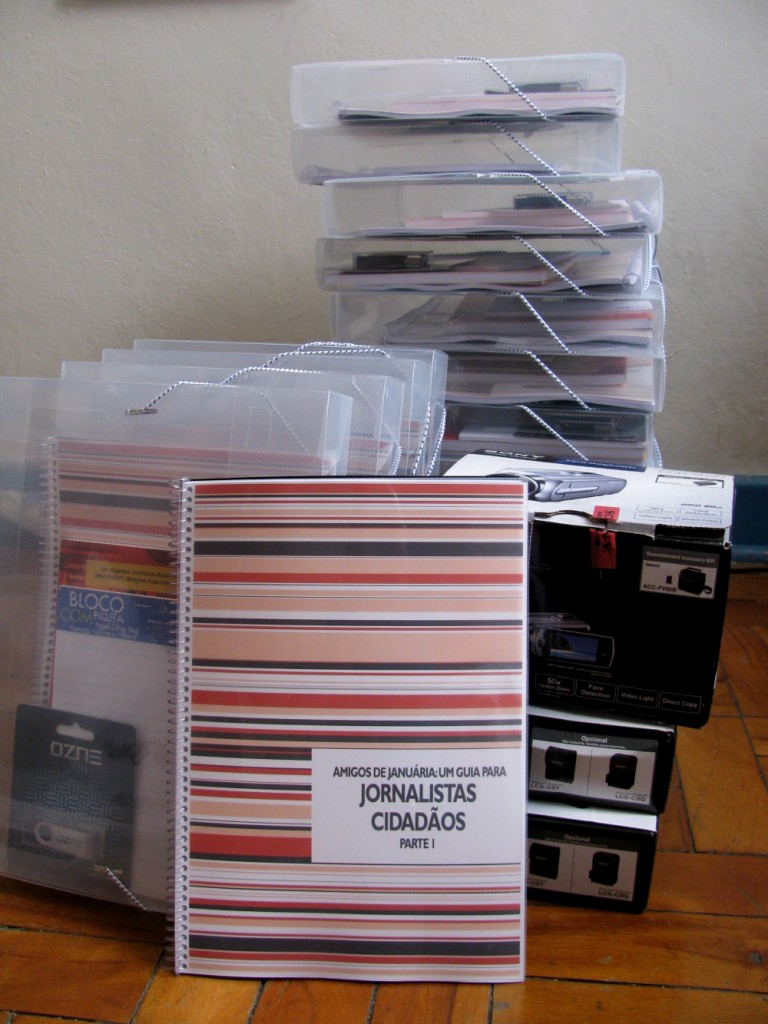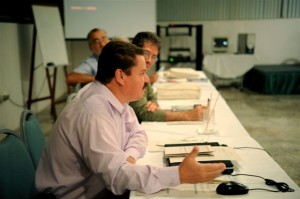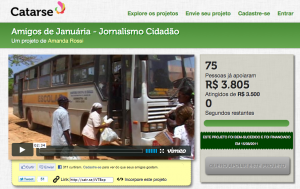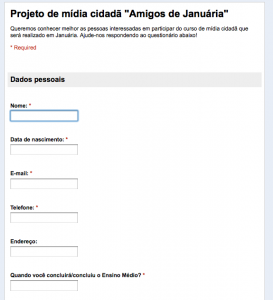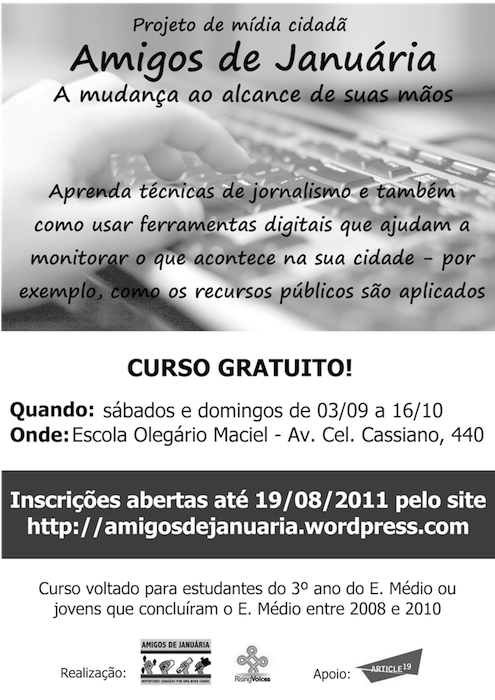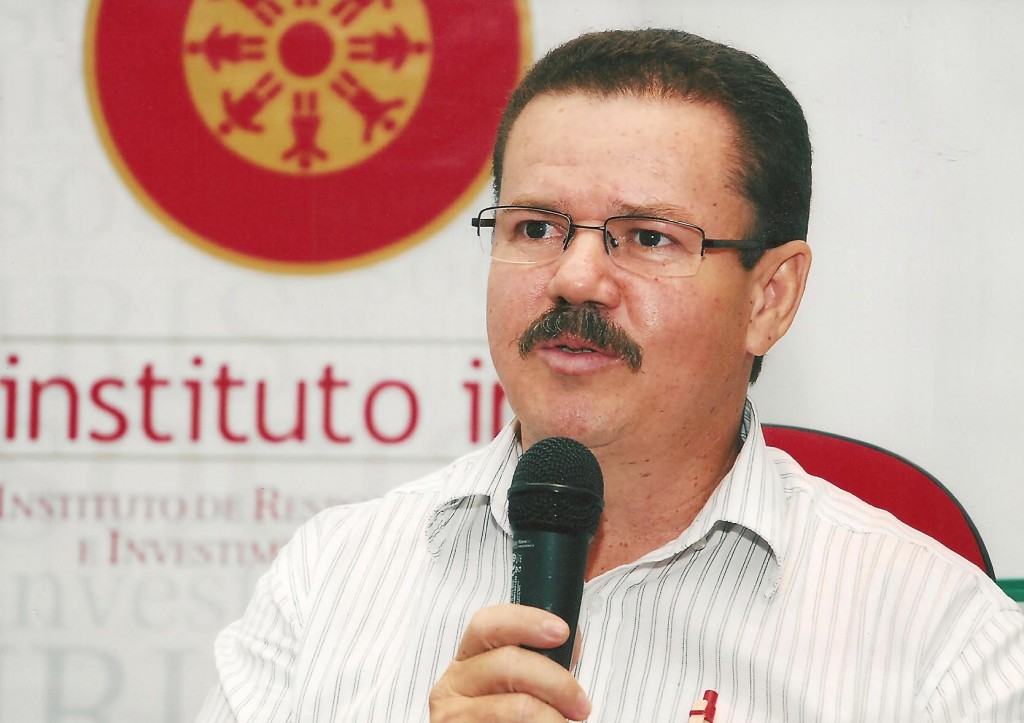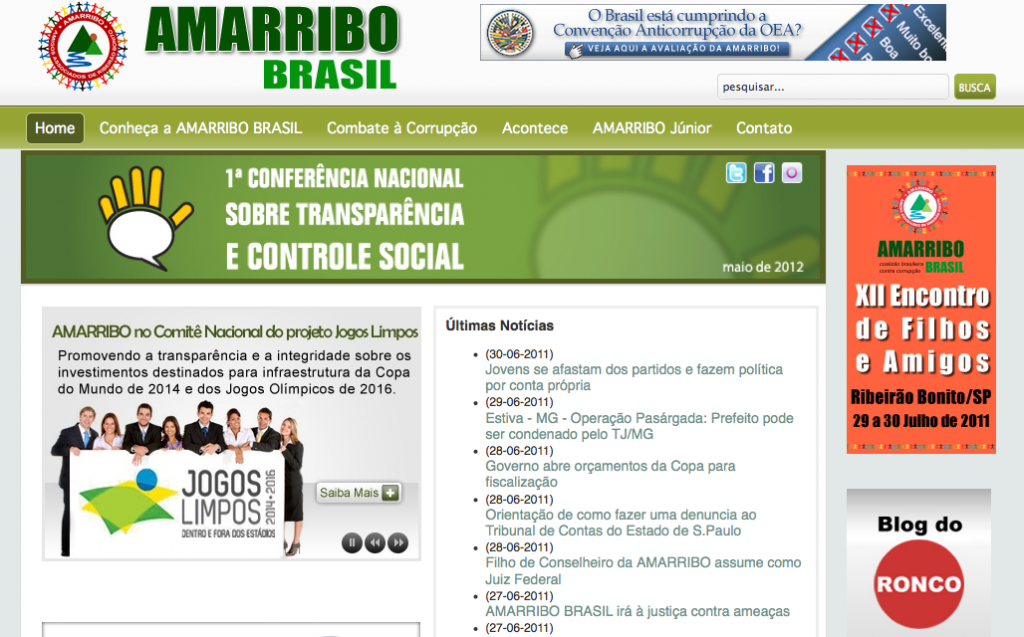As you all know, the project's workshops will start tomorrow! Today, we organize the course materials that will be given to each student: a pratical guide to citizen journalists written by the project's team, one book called “The Fight Against Corruption in Brazilian Towns” and a flash drive. We also bought two cameras and one hand cam! Can't wait to use these materials with the students!
Author Archives: Amanda Rossi
Corrupt as any other Brazilian town
This is the second part of the interview we did with Fábio Oliva, who is an investigative journalist, active blogger (http://blogdofabiooliva.blogspot.com/) and founder of the Friends of Januária Association (Asajan). Asajan has been fighting corruption and monitoring public expenditures in Januária for seven years. In this part, Fábio says “the same corruption that exists in Januária exists in every brazilian town”. What is different in Januária is that the town's citizens started to monitor the public administration and, as a consequence, begin to discover corruption cases. Click here to read the first part.
How was it, starting up Asajan?
It was easy when it came to finding evidence and difficult when it came to raising awareness among the population. In relation to evidence, there had been some people in Januária collecting documents for a long time by the time we started. They had also been making formal accusations at various federal offices in change of accountability and control. However, these people had not achieved any positive results. Sometimes, the reason for that was that they didn't know what were the right procedures to make formal accusations and they ended up sending the documents to the wrong offices. When Asajan started, we received three boxes full of documents, collected by Suely Pereira de Almeira, a former health councilor. Those documents gave us the ammunition for a series of formal accusations e lawsuits – actually, they were so well written that they are still yielding positive results.
What was the first reaction of people from Januária to Asajan's work?
Many people used to tell us that, even though the work we had been doing was very beautiful, we would not achieve any positive results. What they used to say was: the reality of the town had always been like that and will always be like that. “There is no chance”. They would not believe that things could really change! Anyway, we had to motivate ourselves to continue our work. However, at the end of the day, Januária people started to think differently. The change in thinking happened in 2006, two years after the foundation of Asajan. That year, the mayor of Januária was put in jail by the Federal Police – Asajan helped to investigate him. Besides the mayor, the authorities also put in jail a group of businessmen who were embezzling money from the education budget. It was not the first time Asajan helped to remove a corrupt politician from office. From 2004 to 2006, the Association was successful in the dismissal of other mayors. However, it was the first time that a mayor was put in jail – and people usually think that there is no punishment if there is no prison time.
What happened next?
After this detention, people from Januária started to protest. It was the first time in 145 years of the town's history that a mayor and a group of businesspeople were put in jail because of corruption. This fact gave people the courage they needed to act. We begin to hold public demonstrations with 700, 800 people on the streets, something that had never happened before in the town. Besides that, people started to go to the Public Prosecution Office on their own to make formal accusations. Before, only Asajan would make formal accusations – people would come to us first. This change happened because people started to believe in the fight against corruption and in Asajan's work. I think that the biggest legacy Asajan will leave to the people of Januária is that they started to believe that it is possible to change and to punish corruption. It it not important to “own” the idea, the important thing is that the work remains even if those that started it go away. What is important is that people continue to be mobilized and that they believe.
It is really remarkable that Januária had 7 different mayors in the last 8 years. Why did that happen in Januária?
Before, I used to think that Januária was the most corrupt town in Brazil. Then, I started to be invited to give lectures and to help create NGOs to fight corruption in other Brazilian towns (Asajan helped create other 6 “associations of friends” in the North of Minas Gerais, São Paulo and Ceará) and I changed my mind. I started to think that Januária is not the most corrupt town in Brazil. The same corruption that exists in Januária exists in every Brazilian town. The reason why many mayors were dismissed from office in Januária is that its citizens got excited about keeping track of the public administration. In any place where there is oversight, mayors will be dismissed. Besides, we developed an investigation technique that helped a lot. Until 2004, when Amarribo was created in Ribeirão Bonito, to dismiss corrupt politicians and put them in jail was not common at all in Brazil. Today, the situation is very different. If you watch and read the news, you will find everyday a report about a Brazilian mayor who got dismissed or a politician and a businessman that got arrested. Despite the high number of politicians who were dismissed from office in Januária, what we observe is that the corruption cases we find out about are those where corruption “went wrong”. There is also the corruption that was successful, that nobody discovered and never will.
How is this investigation technique?
We gather all the evidence about the case we are investigating. Then, we give them to the state attorneys. The only thing we cannot do is interview witnesses – this has to be done by the state attorneys. By giving them the evidence, we can speed up the process. Another important thing is that the network of “Associations of Friends” helps us investigate (read about the “Association of Friends” model and how it has spread to almost 180 towns in Brazil). For example, the state attorneys is suspicious about a company which has contracts with the town's administration. Its documents says it is located in another state. To check if the company is a” ghost” or not (legitimate ou not), it would be necessary to take a photo its [physical] address. However, the Public Prosecution Office does not have a big enough work force. On the other hand, the network of “Association of Friends” is spread across the country and can easily do it. Besides, it is easy to get access to information in some public institutions nowadays, which helps us investigate. For example, you can download on the internet data about any Brazilian company. You can see who the partners are, if they are family relatives of any politician, if they had already been involved in any corruption case in other towns…
(to be continued…)
Great news!
We are sorry we took so long to update the blog! Meanwhile, we worked a lot and many good things happened. As a result, we have great news!
First, we were successful in gathering collective support for the project. Do you remember that we put it on a Brazilian crowdfunding site, called Catarse, in June (http://catarse.me/en/projects/198-amigos-de-januaria-jornalismo-cidadao)? Our objective was to ask for extra support, especially because the final RV grant ended up being a little bit smaller than the amount we asked for and we would need more money to do the project the way we had planned before. At Catarse, the amount we asked to be funded was R$ 3.500. We had 45 days to raise it – the deadline was 15 August.
And we got it! By that date, we raised R$ 3.805 (9% more). The money were donated by 80 people, based around Brazil and also in other countries. We would like to thank everybody that helped us, by donating or by helping us publicize the project. Since Catarse has some administrative fees and we will offer rewards to those who supported us, the sum of money that became available to the project is R$ 3.400 (something like US$ 2,125). We are using these funds to buy multimedia equipment, print better course materials and help trainers pay for their accommodation.
Other good news is that 51 young people applied to participate to the project. We are very excited! As the project will train 15 citizen reporters, we are deciding who are those that will be called to be part of it, based on the answers they gave on their application forms. Soon, we will announce the selected participants.
More news: we ended the first part of the course material and we will make it available online soon. We also gained support from Amarribo (see here what we wrote about this association in May: https://rising.globalvoicesonline.org/januaria/2011/05/22/associations-of-friends-a-successful-model-to-fight-corruption/), which will donate 15 books called “The Fight Against Corruption at Brazilian Municipalities”. Finally, we are trying to organize a special lecture by a Brazilian institution that has a very important role in fighting corruption in the country (we will give more information about this soon!).
And it is important to remember you that the project will really begin next week!!! Time flies, doesn't it! On September 3-4th, Jamila Venturini and Fabio Oliva will give the first class in Januária. Stay connected, because from now on we will have much more news! And the citizen reporters will start to produce news about the project and also about their city!
New poster to announce the project in Januária
This week, Januária's schools and colleges will receive this poster. It invites students to subscribe at the Friends of Januária project, which will take place in September and October, at Olegário Maciel Public School. It says: “Learn journalism skills and how to use digital tools that help to monitor what happens in your town – for example, how public resources are being spent”. To subscribe, the student must be studying at the last semester of High School or he must have graduated between 2008 and 2010. We already sent 120 of these posters to 10 schools and asked them to put them up at their classrooms. Subscriptions can be done until 19/08 at our new blog (in Portuguese): http://amigosdejanuaria.wordpress.com.
“Corruption kills people and death is forever”
Crowds can also help Friends of Januária
Since Rising Voices gave us the opportunity to make this citizen media project a reality, we have had great surprises! Thanks to RV's support, we have been connecting with many people and other organizations that like the project and want to help it somehow! That gave us even more enthusiasm to do the best we can!
Some people has given us fantastic ideas, others have offered to publicize the project's activities and, finally, there are those who want to help fund the project with small amounts of money. Well, we have always imagined what a better project we could do if we had more funding… especially because the final RV grant ended up being a little bit smaller than the amount we asked for.
Meanwhile, we have also connected with a nice brazilian crowdfunding site, called Catarse (http://catarse.me). We sent our project to its crew and told them the amount of extra money we would need. They really liked the project and decided to support it by adding it to Catarse!
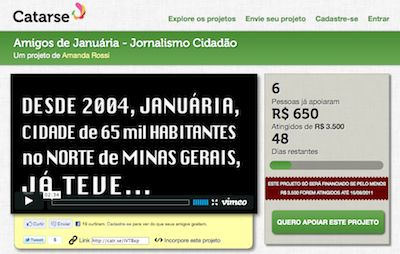
At last, our biggest news is that the public can also help Friends of Januária at Catarse! Anyone with a credit card can donate. The smallest contribution available is only R$ 10 (around US$ 6)! Our final deadline is August 14th! If you know someone that may want to support us, you can help us by sending the following link to those interested:
http://catarse.me/en/projects/198-amigos-de-januaria-jornalismo-cidadao
We already have an English version of it and we will see if we can publish it as well.
We are asking for R$ 3.500 total. Catarse has some administrative fees and after accounting for the rewards we will offer to those who support us, the sum of money that would become available to the project is R$ 2.800 (something like US$ 1,750).
This funds will be used, for example, to buy multimedia equipment (our estimated budget for this was US$ 600, which could only buy a very simple video camera in Brazil), pay for one or two extra visits to Januária, print better course materials, and help trainers pay for their accommodation in the town.
But don't panic! If we don't succeed in achieving this extra funding, the project will still happen. With the Rising Voices grant – in addition to some volunteer aid from the trainers – we can make it! The main reason we are looking for more money is because we believe the project could become stronger with extra support!
Anyway, we are being positive! We think we will get the extra support we asked for from brazilian crowdfunding site! On the second day, we already got 19% of the amount we asked for! Great, isn't it??! : )
“Associations of Friends”, a successful model to fight corruption
Today we will introduce you to our greatest partner, the Friends of Januária Association (Asajan) and we talk about the rise of the “Associations of Friends” model, focused on the fight against corruption, in many Brazilian small towns.
This story begins in 1999, when a group of citizens from Ribeirão Bonito, a small town in the São Paulo countryside, with a population of only 12 thousand people, created the NGO Associated Friends of Ribeirão Bonito (Amarribo). “After seeing the deterioration of their town, caused by the lack of public resources, a group of citizens started to search for alternatives to make Ribeirão Bonito recover from its problems”, explains the organization at its site (http://www.amarribo.org.br/).
In that same year, Amarribo started to suspect that the town's mayor was involved in the embezzlement of public funds. The main symptom was that the mayor's family was getting richer after he was elected. Then, Amarribo started an investigation, collected proof and made public accusations against him. Along with this process, Amarribo raised awareness about the issue of local governance among the town's residents – 10% of them (1,200 people) went to streets when the mayor was going to be released from office due to wrongdoings. Finally, the mayor was put in prison in 2002.
This story of success about the residents association which removed a corrupt politician from the town's administration was something pretty new in Brazil! Soon, Amarribo became an example to be followed by other towns and, little by little, the “Associations of Friends” model, focused on monitoring public administration, spread around the country. Nowadays, Amarribo's network has organizations in 173 towns in Brazil! One of them is Januária.
Januária is a small town in Northern Minas Gerais. Its residents keep on remembering the time when the town didn't have so many problems. Actually, Januária had a stronger economy and was one of the biggest and one of the most tradicional producers of “cachaça”, a brazilian drink. Then, things started to deteriorate in Januária.
Fabio Oliva, who is a local journalist (http://blogdofabiooliva.blogspot.com/), will never forget the day when his father had an cerebral hemorrhage. As the local hospital wasn't able to take care of him, he had to be sent to another hospital, 170 km far from Januária. In the middle of the road, the ambulance ran out of fuel. If it wasn't enough, it also ran out of oxygen. “Probably, my father would die anyway. But I wish he had died with more dignity inside a hospital, not on a road, without oxygen, under a 40˚C heat”, says Oliva. Angry about the poor conditions of Januária, Oliva met Amarribo's work and started to imagine how Januária could become a better place if its residents started to monitor the local administration. Soon after, Oliva gathered some friends in Januária and created Asajan. The year was 2004.
One of these friends was a municipal health advisor, Suely Pereira, a former hairdresser. Suely used to make copies of every public document that passed by her and brought four boxes full of documents from the public administration to the group. With these documents in their hands, Asajan's members had to learn how to investigate. And they learned well. “Since then, we have been fighting corruption and releasing corrupt mayors from office. Asajan was involved in all cases in which mayors were released from office due to wrongdoings”, says Suely.
The work done by Asajan also inspired many other citizen groups to create new “Associations of Friends” in the northern Minas Gerais. A success partnership between citizens who care for their town's future!
We are Friends of Januária
We are here to introduce to you the project “Friends of Januária”, in central Brazil, which will provide training to citizen reporters to monitor their public administration and budget and fight corruption.
First of all, it is worth telling you a little bit about the access to information in Brazil and about what has been happening in Januária for the last few years. Today, Brazil sees an open access to information movement in which civil society, collectives, NGO's and individuals are engaged in. There is a long way to go, since Brazil still doesn’t have an Access to Information Law. Some data is already available online, but one of the biggest challenges faced is that the data is spread across many sites, which are difficult to access. Although many journalists have special skills to access that data, the Brazilian media is highly concentrated in São Paulo, Rio de Janeiro, and Brasília, the most important towns in Brazil, and they can't monitor what happens in small towns far from big urban centers.
Let’s take a look in what happens in Januária, a small town in central Brazil with a population of 65,000. Januária has had a recent history of difficulties with its local government – in the span of eight years, the town has gone through seven different mayors, most of them removed from office because of mismanagement of public funds. Well, the town should be the focus of many reports, shouldn't it? But that doesn't happen. The local government receives little or no press coverage at all! If it wasn't for Fabio Oliva's work, who is a blogger and activist, few would be investigated by media. Oliva is one of the founders of the Association Friends of Januária (Asajan), which has been raising awareness about the issue of local governance among the town's residents, through investivative journalism work and public awareness campaigns.
The main objective of “Friends of Januária” is that citizens can become reporters of their own towns, getting access to public data. Access to information is a human right and should be available to all! Once they share that public data, they will raise community awareness about how important it is to fight corruption. So, the project's aim is to provide a course about access to public information which encourages participants to share the collected data through online reports.
We plan to start the course during second semester of 2011. Until now, our biggest challenge is to overcome the barriers posed by high transport costs – we need to move the course educators from São Paulo to Januária. The problem is that it is very expensive to go to one place to another in Brazil!! During the last weeks we have been searching for additional support to the Rising Voices grant because then it would be easier to pay for these costs and provide a longer course. We are confident that we will succeed!
Soon, we will start one of the most important parts of the work: to prepare the course material and its classes. We believe the material and the classes can be used in many other small towns, so we will do our best!! Our idea is to gather knowledge and experiences from different organizations, collectives and individuals that have worked with access to information, public administration monitoring, and corruption investigation. During this step, we will share everything with you here at the blog!

